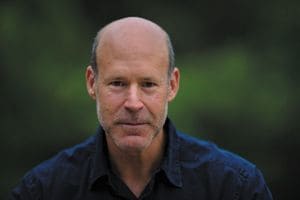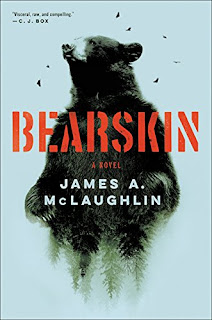Thriller.
Hands down, thumbs up, no quibbling. We know this from the git-go.
Bearskin,
the debut novel by James A. McLaughlin, heralded by The
New
York Times
as one of four authors "to
watch this summer,"
has thus achieved the imprimatur that while most assuredly a
page-snapping genre entertainment also reaches the rarefied stature
of literature.
With such prominent exaltation at launch we expect
at least a fairly recognizable highbrow filigree, and Bearskin
delivers. Without question. I enjoyed this
novel on both levels.
Its story kept me rapt, racing to learn what happens next while
admiring some very fine writing--even glimpses of sublime brilliance
in its descriptions of scenery in Virginia's Blue Ridge Mountains and
in the Arizona desert country. But, maybe because it’s McLaughlin’s
maiden novel, and maybe because his publisher was a tad lenient with
the editing, Bearskin
occasionally
shows its petticoat. There’s the awkwardly extravagant vocabulary.
Rice, the protagonist, buried
the deliquescent
cow
head...gunfighters
had
been in an egregious number of firefights...asked
if he'd done a certain something, he
demurred...
Granted
this is the author’s voice, but it’s Rice’s viewpoint. And
granted Rice has some college biology background and probably used a
big word now and again in scholastic settings. But he’s a long way
from the ivy halls. These days he’s ducking Mexican drug cartel
assassins, interacting with barely literate mountain rednecks, and
poking around the woods in black-bear country. Not surprisingly the
voices sometimes get tangled. Here he is trying to lure a country
outlaw biker type away from a biker party in full yeeha swing:
“He laughed, trying to sound drunk. ‘There’s some bitch lying
in the bushes back here!’” Lying?
Really? Why not layin’
**hic**
or, better yet, why any verb at all?
Yeah,
yeah, I know, picky picky, but it’s a telling example of one of
Bearskin’s
several weaknesses. Another is the distraction of random dream-states
Rice calls “fugues,” which slow the narrative without
contributing much if anything to story or character. Too frequently
McLaughlin gives us too much thinking, too much telling at the cost
of showing, and he makes the all-too common mistake of describing
with detail overkill—the kind that can sharpen focus in shorter
pieces but clog the gears of a story that’s clipping along quite
nicely on its own thank you very much. But blink and you’ll miss
him slapping one over the center-field fence that can leave you
gasping for breath:
While he watched, a fresh
breeze brushed against the big tulip trees, red oaks, sugar maples.
Heavy branches rose and fell in slow motion, and a million leaves
twisted on their stems, showing silver underneath. The forest was
eerily animate, a gigantic green beast dreaming, its skin twitching
and rippling. Not quite threatening, but powerful. Watchful.
Or punching
a line drive to the gut:
“The
energy coming off that forest, so close now, thrummed in Rice’s
chest, like
he was standing next to a pipe organ.”
There’s
enough of that kind of writing throughout to seriously tingle any
literary sensibility. Loveliness dancing along in a standard
page-flipping thriller, high-wire agility for a rookie novelist
mixing such yin/yang styles in a single book. We know the Yankees are
taking a look, but it’s a sure bet Bearskin
can play wit’ da Bums.
 |
| McLaughlin |
For
my money McLaughlin’s touched all three thriller bases, and should
make it home with a dirty slide and a decent review in Soldiers
of Fortune.
The basic plot’s simple. We know Rice is trying to hide from
Mexican drug lords, so it won’t be long they’ll track him down.
Mandatory in such tales—like Chicken Man, the killers are
everywhere they’re everywhere. We jump right in at the prologue,
where the cartel demonstrates its clout by finagling two hit men into
Rice’s prison cell, and then out again, one of them dead and the
other with severed Achilles tendons. Leaves us no doubt what Rice is
up against now that he’s out of slam and living on a 7,000-acre
forest preserve as its lone caretaker.
For
us reaching the inevitable showdown will take upward of 300 pages.
McLaughlin does this well, doling out the suspense in tantalizing
nibble-size increments of pulse-quickening happenstance, flashbacks,
fickle fate, and derring-do. Rice meanwhile practices his martial
arts, vocal impressions—y’all--
cunning, and chivalry trying to protect the local bear population
from illegal hunting and shaking up the local outlaw types to learn
who beat and raped blonde, leggy Sara, his predecessor, who checks in
on him now and again.
Now
comes the kind of detail so important to thriller aficionados:
brands and models of everything from clothing labels and pocket
knives to security systems, firearms, and accessories, each described
with daunting precision—type, caliber, function...you know the
drill—personal combat tactics, and, unusual I hope, hideous methods
of physical persuasion such as the old icepick in the ear-canal
trick. About the time I started wondering how a biology major (albeit
ex-con) would know all of this, Mclaughlin gives us a hint:
Rice had been “well schooled” by Fernandez, his cartel-connected
cellmate, and several Fernandez associates, “all of whom must have
recognized something in Rice:
a powerful will to survive, a latent capacity for violence, a
willingness to kill. Some athletic aptitude. Certainly a good memory,
though most of it he’d prefer to forget.” Okay, it’s a stretch.
But, good gravy, what’s a thriller without a stretch or two, no?
If
I could make one change before turning this better-than-average novel
over to a savvy and insightful editor, it would be to switch the
voice from third-person to first. This would eliminate inherent
confusion when dialects are mingling and pronouns are losing their
subjects. As it stands right now, though, Bearskin
is a viable Hollywood prospect. It has story, characters,
and...ackshun!
And good screenwriters are incorrigible tighteners and streamliners.
So
who should play Rice? (Cruise? Nope, impossibly tied up) Suzy may be
onto something. She’s dispatcher/secretary
for the local sheriff and has taken a shine to our tarnished hero:
“You
look like that actor, Viggo Mortenson? But not in a good way. You
know, like in The
Road?”
 |
| Viggo Mortenson |
I
didn’t like The
Road,
but that’s a whole ‘nother kettle o’ carp.

No comments:
Post a Comment